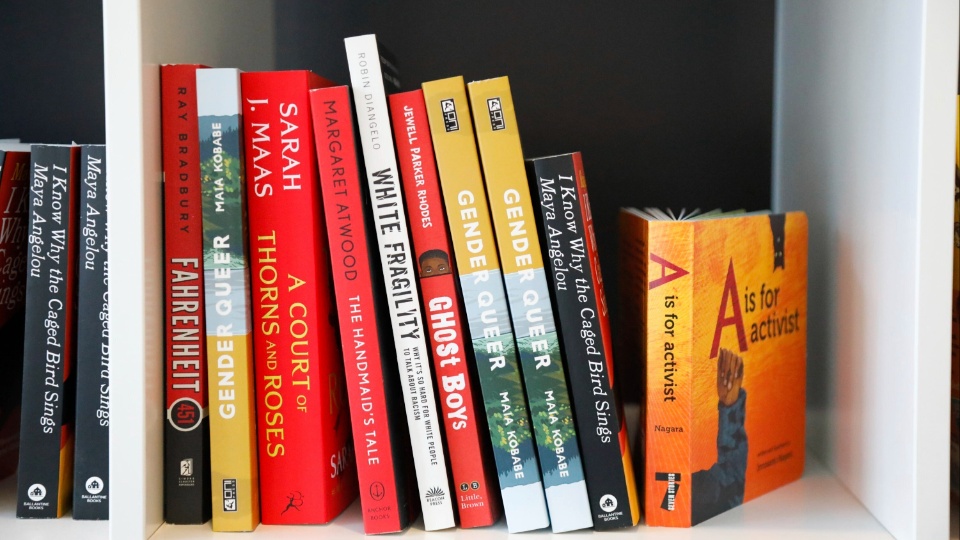
NEW YORK—Bans on books centering LGBTQ people and people of color are sweeping the country. Led by far-right parents and politicians claiming books dealing with queer themes and the history of racism indoctrinate young readers, the uptick in the number of bans has left many wondering how they can keep valuable literature on the shelves.
GLAAD, the world’s largest LGBTQ media advocacy organization, along with EveryLibrary, a national organization supporting campaigns against book bans, have announced a new resource to help communities push back against this literary censorship.
The resource guide Book Bans: A Guide for Community Response and Action is a downloadable toolkit that informs and prepares community members to organize and work with media to “ensure diverse local voices are heard against book bans and in support of LGBTQ people and all people of color.”
According to a recent study released by the writers’ organization PEN America, book bans in U.S. public schools increased by 28% in the first half of the 2022-23 academic year. The organization described the bans as a “relentless conservative crusade to constrict children’s freedom to read.”
The study surmised that over a six-month timeline, book bans across the country affected over 800 titles. This equates to over 100 new titles removed from student access each month. Pen America also noted that the most prevalent culprits in the book bans were the states of Texas, Florida, Missouri, Utah, and South Carolina. Texas led the list with 801 bans in 22 school districts, followed by Florida with 566 in 21 districts and Pennsylvania with 457 bans in 11 districts.
The study noted that 30% of the unique titles banned are books about race, racism, or feature characters of color. Meanwhile, 26% of unique titles banned have LGBTQ characters or themes.
Last month, PEN America joined Penguin Random House, parents, and censored authors to sue Escambia County in Florida, alleging school board members banned books and ignored recommendations from its formal review process to return the books to shelves. PEN America found that 96% of book challenges were initiated without the requisite written forms that most district policies officially require.
PEN’s study highlighted the evolution of book bans over the last two years in the United States. In the 2021-22 school year, parent-led groups coordinated to advance book censorship. For the 2022-23 school year, they had the backing of governments, with state legislation adding to the pressure for more extreme book bans.
GLAAD’s guide offers community members step-by-step recommendations to resist censorship and protect the freedom to read. They include:
- Organize a diverse local coalition including students, parents, teachers, librarians, LGBTQ advocates, authors, health professionals, and clergy.
- Create fact-based and meaningful messages to inform and inspire all in the community and present them to school and library boards.
- Engage news, social, and local media with facts and local interview voices and resources.
- Inform everyone in the community, including families, businesses, elected officials, and taxpayers, about the absurdity of book bans and the threat they pose to vulnerable youth. Focus also on the entire community’s safety, prosperity, and reputation.
- Hold school and library boards accountable to all taxpayers, ensure proper protocol is being followed in book reconsiderations, and demand necessary reforms to end the skyrocketing and discriminatory wave of book banning.

Santaluces High School teacher Michael Woods stands in front of his school in Lantana, Fla., wearing his protest shirt ‘We Are All Human’ in opposition to recent book bans by Florida Gov. Ron DeSantis on May 24, 2023. | Jim Rassol / AP
“This guide is urgently needed as communities face a skyrocketing number of book ban attempts across the country targeting LGBTQ books and books about race and racism,” explained GLAAD President and CEO Sarah Kate Ellis.
Ellis continued: “LGBTQ people and books about us belong in libraries, schools, and everywhere. This playbook to push back against book bans will help communities become safer, stronger, and smarter. By using the power of personal storytelling and engaging media, communities can unite with their neighbors, send a signal of welcome and acceptance, and see challenged books return to shelves. Communities who care about each reader and a future where all can be free must get the last word.”
EveryLibary Executive Director John Chrastka said, “We cannot allow this attempt to erase the lives of millions of Americans through book bans to continue. That’s why we’re committed to providing pro-bono resources to communities who are fighting back. I know this guide will help hundreds of communities respond to the attack on their First Amendment rights and the rights of their LGBTQ friends and family.”
The toolkit can be downloaded here.
We hope you appreciated this article. At People’s World, we believe news and information should be free and accessible to all, but we need your help. Our journalism is free of corporate influence and paywalls because we are totally reader-supported. Only you, our readers and supporters, make this possible. If you enjoy reading People’s World and the stories we bring you, please support our work by donating or becoming a monthly sustainer today. Thank you!










